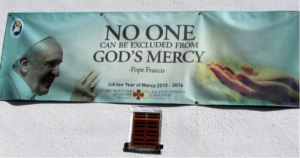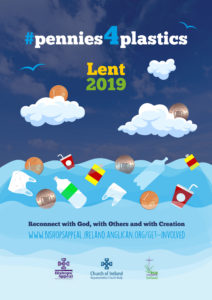‘The Lord has truly risen, alleluia.’ (Invitatory antiphon)
These days of Covid-19 the world struggles with belief and unbelief. Authorities suggest to us it’s best to stay indoors, to wash hands, exercise a cough etiquette and to social distance etc. If we believe, we will comply. If we don’t believe, we won’t comply. Do we believe that the restrictions will be lifted on the 5th May? Some believe they will be lifted, some don’t. Time will tell.
On a regular basis people ponder the questions in life, ‘what do I believe? Why don’t I believe? In whom do I believe? Why do I believe?’ Such questions help to explore personal beliefs. Somewhere in our hearts we possibly have a personal creed by which we live.
In building relationships with family and friends, children learn to believe or not believe. Belief and trust go hand in hand. I believe in a person because I trust him/her.
Jesus tells the crowd in the Gospel today that the work of God is ‘to believe in him whom he sent’ (Jn 6:22-29). It is possible to tune into the parish webcam to hear this Gospel read at Mass or to read it in the New Testament.
God sent his Son Jesus that we might believe in him. When Jesus was on earth some people believed in him and others didn’t. Jesus often scolded people, even the disciples who were closest to him for their lack of faith. Jesus understood their weakness as they struggled with faith. On the road to Emmaus Jesus wasn’t slow to say to the disciples, ‘Oh, how foolish you are, and how slow of heart to believe all that the prophets have declared!’ (Lk 24).
The disciples found it hard to believe in Jesus’ resurrection. The post-resurrection stories spring to mind the encounters with Mary Magdalene and the other women coming to the tomb on Easter Sunday morning; Peter and John; Thomas who doubted; and the two disciples ‘On the Road to Emmaus’—- all were challenged in their belief. In their unbelief, Jesus stayed patiently with them until they recognised him.
Jesus continues to teach his disciples to believe. He forever invites us as disciples, to deepen our relationship with him. However, he leaves us free to choose to answer his call. We believe in his miracles. We believe God sent Jesus. We pray because he taught the disciples to pray the ‘Our Father’. We believe in Jesus because we read the Bible which is the inspired Word of God. We believe that Jesus lived and died, that he was raised to new life and that he ascended into heaven. We believe Jesus is now sitting at the right hand of the Father in heaven. We believe Jesus sent his Spirit. We believe that the Spirit of Jesus is with us today. But what about lived experience? We strive to live to transmit our faith in action.
We are thankful for our gift of faith which helps us to believe in God, the Father, the Son and the Holy Spirit (The Trinity). Our faith is kept alive when we pray, when we accept Jesus’ teaching and follow his example, and do acts of love for one another. We pray in thanks for God’s constant love and presence in our lives.
ABOUT THE APOSTLES’ CREED
‘The Apostles’ Creed’ is ‘a faithful summary of the apostles’ faith’. Before Jesus ascended into heaven on Ascension Day, he asked his disciples to teach the people what he had taught them. Jesus said to them, ‘I have been given all authority in heaven and on earth. Go, then, to all the peoples everywhere and make them my disciples: baptise them in the name of the Father, the Son and the Holy Spirit, and teach them to obey everything I have commanded you. And I will be with you always, to the end of time.’ (Mt 28:19-20).
The apostles made a list of things they knew Jesus would want people to hear and believe. This is The Apostles’ Creed. This prayer is introduced to the children in the Grow in Love 5 programme, Third Class/P5. It is accessible in the Grow in Love Children’s textbooks and e-books.
The Nicene Creed is introduced in GIL 7, Fifth Class/P7. The Nicene Creed is recited during Lent and Easter season in the liturgy and is also available in e-books for Fifth /P7 and Sixth classes.
Online resources are available on the VERITAS website:
Logon: www.veritas.ie
Email@trial@growinlove.ie
Password: growinlove
SONGS to help us believe and trust in God are available as video lyrics on the website: ‘Grow in Love Song’, ‘Sign of the Cross Chant’ ‘Close To You’, ‘Song For A Young Prophet’, ‘Love’, ‘The Summons’ ‘More Than Just’, ‘Without Seeing You’.
PRAY from Grow in Love/I nGrá Dé
Sign of the Cross
In the name of the Father, and of the Son, and of the Holy Spirit. Amen.
Comhartha na Croise
In ainm an Athar, agus an Mhic agus an Spioraid Naoimh. Áiméan.
Apostles’ Creed
I believe in God,
The Father almighty,
Creator of heaven and earth,
And in Jesus Christ, his only Son, our
Lord,
who was conceived by the Holy Spirit,
born of the Virgin Mary,
suffered under Pontius Pilate,
was crucified, died and was buried;
He descended into hell;
on the third day he rose again from
the dead;
He ascended into heaven,
and is seated at the right hand of God
the Father almighty,
from there he will come to judge the
living and the dead.
I believe in the Holy Spirit,
the holy Catholic Church,
the communion of saints,
the forgiveness of sins,
the resurrection of the body,
and life everlasting. Amen.
From the song ‘More Than Just’
‘Jesus, you are with us in your new and risen life.
When we meet, you share with us the things we see
in signs.
At once God brought the people to a new
and promised land.
You’re leading us, you’re changing us.
You make of us a people and a sign of God’s love for all
the world.’
‘Work not for the food that cannot last, but work for food that endures to eternal life, alleluia.’ (Benedictus antiphon)
‘This is the work that God requires: believe in the one whom he has sent, alleluia’ (Magnificat antiphon)
‘Tell the Lord how thankful you are, because he is kind and always merciful.’ (Psalm 118:1).
St Asicus, pray for us.
Sr Anne Neylon


